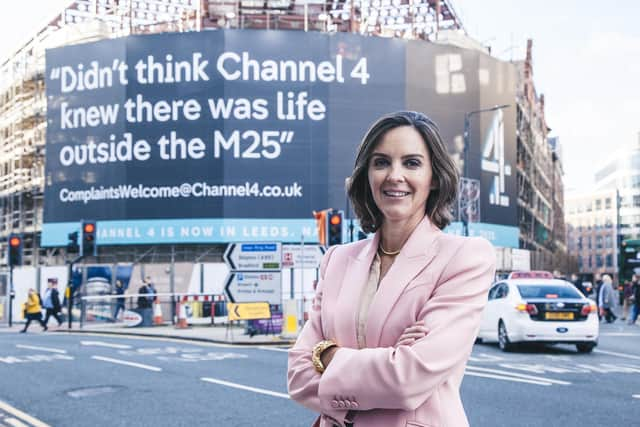Privatising Channel 4 'would put future of Leeds HQ in doubt', suggests chief executive Alex Mahon


In a live event to mark the opening of Channel 4’s new national headquarters in Leeds, chief executive Alex Mahon said the future of the organisation’s regional bases would be uncertain if a new private owner is found.
In 2019, Channel 4 announced it was moving its headquarters to Leeds and opening creative hubs in Bristol and Glasgow. It also has offices in London and Manchester. There are now more than 200 staff based in Leeds, with an intention to have more than 400 workers based outside London by the end of this year.
Advertisement
Hide AdAdvertisement
Hide AdBut Ms Mahon said that model may not be viable under a new ownership structure.


“New owners would also likely want to reduce our office footprint,” she said.
“Although it is helping to build the UK’s creative clusters and level up the nation’s regions, it would not make much sense commercially for a small company to maintain five different locations.”
The Government is currently consulting on plans to privatise the channel, which could be sold off to a private buyer.
Advertisement
Hide AdAdvertisement
Hide AdAt present the channel is owned by the Government and receives its funding from advertising.
The Government has said it is consulting on privatisation because it wants to ensure the long-term survival of the channel.
But Ms Mahon said that Channel 4 has commissioned an independent report, due to be published later this week, that will show there is no economic rationale for such a move.
“Ultimately this is not a decision for us to make,” she said.
Advertisement
Hide AdAdvertisement
Hide Ad“However, having considered all the available analysis extremely carefully and modelled and stress-tested this, we have not seen any evidence that the irreversible change of privatising Channel 4 will be in the interests of either the British audiences or the UK’s economy.
“It could well have serious and long-lasting consequences for our world-leading production section and for the progress that has been made in our creative industries outside of London - plainly speaking, jobs, investment and providing the skills, training and opportunities for young people up and down the UK.”
Ian Katz, the channel's chief content officer, also cautioned that privatisation would affect the output of the channel.
He said: "Some argue that a privately-owned Channel 4 could still deliver its remit as effectively as a publicly-owned Channel 4, so long as it was subject to a demanding set of licence requirements.
Advertisement
Hide AdAdvertisement
Hide Ad"Of course, it's possible to write a licence that sets a specific number of hours for news or education that must be delivered, but this misses the extent to which the remit permeates all our programming far beyond the specific qualities required of us."
He added: "It is worth thinking about Joe Lycett’s Got Your Back, which is hard-hitting consumer journalism married with humour and comedy.
“We tackle subjects as important as mental health and immigration with programmes like This Way Up, Feel Good or Home.
“It’s A Sin laid bare the homophobia of 80s Britain while our upcoming drama Help will lay out the tragedy that played in our care homes in the early months of the pandemic.
Advertisement
Hide AdAdvertisement
Hide Ad“Elsewhere, primetime popular factual shows like The School That Tried to End Racism, The Write-Offs or The Restaurant That Makes Mistakes explores major societal issues such as unconscious bias, adult literacy or dementia and there are plenty more examples of remit delivering shows such as these. None of these contribute to the specific quotas of programming that Channel 4 is required to produce.
“It is very unlikely they would sit under any licence requirements for a private owner of Channel 4. They exist because each and every Channel 4 programme commissioner is motivated to deliver the remit to the greatest audience.
Mr Katz added: "Every part of our output is suffused with purpose, often so lightly that you can barely see it.
"Take some of our biggest shows, like Bake Off, Gogglebox or SAS: Who Dares Wins, these are all purposefully cast with diversity at their heart, diversity of ethnicity, of age, of ability.
Advertisement
Hide AdAdvertisement
Hide Ad"This would inevitably be less important for a purely commercially driven channel.
"Much of the kind of purpose-driven programming that I've just talked about, programming that is frequently unprofitable, would be lost.
"Or look at our commitments to the Paralympic games that finished last night. It's another example of the kind of programming that would almost certainly go.
"Could a privately owned Channel 4 be required by licence to deliver over 1,000 hours of coverage of parasport for two weeks, every four years? Perhaps unlikely.
Advertisement
Hide AdAdvertisement
Hide Ad"So even with tough licence requirements, the channel that viewers would see would be very different to the one they see now.
"The programming that makes Channel 4 so unique might, I fear, be lost.
"To create profitable returns, we would need to radically reshape our editorial mix.
"Without a doubt, this would result in less risk-taking, fewer programmes with real societal impact, and fewer opportunities for new talent."
Advertisement
Hide AdAdvertisement
Hide AdSupport The Yorkshire Post and become a subscriber today. Your subscription will help us to continue to bring quality news to the people of Yorkshire. In return, you'll see fewer ads on site, get free access to our app and receive exclusive members-only offers. Click here to subscribe.
Comment Guidelines
National World encourages reader discussion on our stories. User feedback, insights and back-and-forth exchanges add a rich layer of context to reporting. Please review our Community Guidelines before commenting.